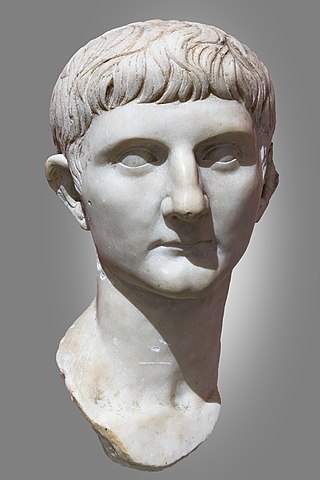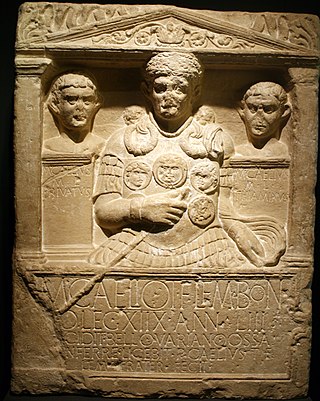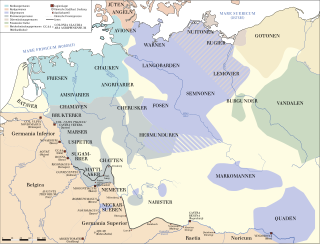
Inguiomer or Ingomar (Latin : Inguiomerus; fl. 1st century AD) was a leader of the Cherusci. He is chiefly remembered as the uncle of Arminius.

Inguiomer or Ingomar (Latin : Inguiomerus; fl. 1st century AD) was a leader of the Cherusci. He is chiefly remembered as the uncle of Arminius.
Alexander Haggerty Krappe proposed the name Inguiomer derives from Old Germanic *Ingwia, related to Yngvi, the older name of the Germanic god Freyr. [1]
Inguiomer was the brother of Segimer, a chieftain of the Germanic Cherusci tribe. This made him the uncle of Arminius and Flavus. Inguiomer is mentioned in Tacitus's account of the Roman reprisal campaigns of Germanicus against the Germans after their defeat at Teutoburg Forest. In AD 15, he is mentioned arguing against Arminius's defensive strategy. He pursued the retreating army of Caecina across rough terrain, suffering a defeat in which he was personally wounded. Inguiomer is also mentioned joining the Marcomanni chieftain Maroboduus in his war against Arminius in AD 17 or 18. He died at some point before AD 47, when the Cherusci are recorded appealing to Rome for Inguiomer's grandnephew Italicus as the only surviving member of their royal family.

Germanicus Julius Caesar was an ancient Roman general, known for his campaigns in Germania. The son of Nero Claudius Drusus and Antonia the Younger, Germanicus was born into an influential branch of the patrician gens Claudia. The agnomen Germanicus was added to his full name in 9 BC when it was posthumously awarded to his father in honour of his victories in Germania. In AD 4, he was adopted by his paternal uncle Tiberius, who succeeded Augustus as Roman emperor a decade later. As a result, Germanicus became an official member of the gens Julia, another prominent family, to which he was related on his mother's side. His connection to the Julii was further consolidated through a marriage between himself and Agrippina the Elder, a granddaughter of Augustus. He was also the father of Caligula, the maternal grandfather of Nero, and the older brother of Claudius.
Maroboduus was a king of the Marcomanni, who were a Germanic Suebian people. He spent part of his youth in Rome, and returning, found his people under pressure from invasions by the Roman empire between the Rhine and Elbe. He led them into the forests of Bohemia, near to the Quadi who already lived nearby, and established a large alliance.

The Suebi were a large group of Germanic peoples originally from the Elbe river region in what is now Germany and the Czech Republic. In the early Roman era they included many peoples with their own names such as the Marcomanni, Quadi, Hermunduri, Semnones, and Lombards. New groupings formed later, such as the Alamanni and Bavarians, and two kingdoms in the Migration Period were simply referred to as Suebian.

AD 17 (XVII) was a common year starting on Friday of the Julian calendar. At the time, it was known as the Year of the Consulship of Flaccus and Rufus. The denomination AD 17 for this year has been used since the early medieval period, when the Anno Domini calendar era became the prevalent method in Europe for naming years.

The Battle of the Teutoburg Forest, described as the Varian Disaster by Roman historians, took place at modern Kalkriese in AD 9, when an alliance of Germanic peoples ambushed Roman legions and their auxiliaries, led by Publius Quinctilius Varus. The alliance was led by Arminius, a Germanic officer of Varus's auxilia. Arminius had acquired Roman citizenship and had received a Roman military education, which enabled him to deceive the Roman commander methodically and anticipate the Roman army's tactical responses.

The Chatti were an ancient Germanic tribe whose homeland was near the upper Weser (Visurgis). They lived in central and northern Hesse and southern Lower Saxony, along the upper reaches of that river and in the valleys and mountains of the Eder and Fulda regions, a district approximately corresponding to Hesse-Kassel, though probably somewhat more extensive. They settled within the region in the first century BC. According to Tacitus, the Batavians and Cananefates of his time, tribes living within the Roman Empire, were descended from part of the Chatti, who left their homeland after an internal quarrel drove them out, to take up new lands at the mouth of the Rhine.

Arminius was a chieftain of the Germanic Cherusci tribe who is best known for commanding an alliance of Germanic tribes at the Battle of the Teutoburg Forest in 9 AD, in which three Roman legions under the command of general Publius Quinctilius Varus were destroyed. His victory at Teutoburg Forest would precipitate the Roman Empire's permanent strategic withdrawal from Germania Magna. Modern historians have regarded Arminius' victory as one of Rome's greatest defeats. As it prevented the Romanization of Germanic peoples east of the Rhine, it has also been considered one of the most decisive battles in history and a turning point in human history.

The Chauci were an ancient Germanic tribe living in the low-lying region between the Rivers Ems and Elbe, on both sides of the Weser and ranging as far inland as the upper Weser. Along the coast they lived on artificial mounds called terpen, built high enough to remain dry during the highest tide. A dense population of Chauci lived further inland, and they are presumed to have lived in a manner similar to the lives of the other Germanic peoples of the region.

The Cherusci were a Germanic tribe that inhabited parts of the plains and forests of northwestern Germany in the area of the Weser River and present-day Hanover during the first centuries BC and AD. Roman sources reported they considered themselves kin with other Irmino tribes and claimed common descent from an ancestor called Mannus. During the early Roman Empire under Augustus, the Cherusci first served as allies of Rome and sent sons of their chieftains to receive Roman education and serve in the Roman army as auxiliaries. The Cherusci leader Arminius led a confederation of tribes in the ambush that destroyed three Roman legions in the Teutoburg Forest in AD 9. He was subsequently kept from further damaging Rome by disputes with the Marcomanni and reprisal attacks led by Germanicus. After rebel Cherusci killed Arminius in AD 21, infighting among the royal family led to the highly Romanized line of his brother Flavus coming to power. Following their defeat by the Chatti around AD 88, the Cherusci do not appear in further accounts of the German tribes, apparently being absorbed into the late classical groups such as the Saxons, Thuringians, Franks, Bavarians, and Allemanni.

Old Norse Yngvi[ˈyŋɡwe], Old High German Ing/Ingwi and Old English Ingƿine are names that relate to a theonym which appears to have been the older name for the god Freyr. Proto-Germanic *Ingwaz was the legendary ancestor of the Ingaevones, or more accurately Ingvaeones, and is also the reconstructed name of the Elder Futhark rune ᛜ and Anglo-Saxon rune ᛝ, representing ŋ.

Publius Quinctilius Varus was a Roman general and politician under the first Roman emperor Augustus. Varus is generally remembered for having lost three Roman legions when ambushed by Germanic tribes led by Arminius in the Battle of the Teutoburg Forest, whereupon he took his own life.

The Battle of the Weser River, sometimes known as the First Battle of Minden or Battle of Idistaviso, was fought in 16 AD between Roman legions commanded by Roman Emperor Tiberius's heir and adopted son, Germanicus, and an alliance of Germanic peoples, commanded by Arminius. The battle marked the end of a three-year series of campaigns by Germanicus in Germania.

This is a chronology of warfare between the Romans and various Germanic peoples between 113 BC and 476. The nature of these wars varied through time between Roman conquest, Germanic uprisings and later Germanic invasions of the Western Roman Empire that started in the late second century BC. The series of conflicts was one factor which led to the ultimate downfall of the Western Roman Empire in particular and ancient Rome in general in 476.
Segestes was a nobleman of the Germanic tribe of the Cherusci involved in the events surrounding the Roman attempts to conquer northern Germany during the reign of Roman Emperor Augustus.

The Angrivarii were a Germanic people of the early Roman Empire, who lived in what is now northwest Germany near the middle of the Weser river. They were mentioned by the Roman authors Tacitus and Ptolemy.
Flavus was a member of the royal family of the Germanic Cherusci tribe who served in the Roman military. He is chiefly remembered as the younger brother of Arminius, who led the Germans to victory over the Romans at Teutoburg Forest in AD 9.

The Roman campaigns in Germania were a series of conflicts between the Germanic tribes and the Roman Empire. Tensions between the Germanic tribes and the Romans began as early as 17/16 BC with the Clades Lolliana, where the 5th Legion under Marcus Lollius was defeated by the tribes Sicambri, Usipetes, and Tencteri. Roman Emperor Augustus responded by rapidly developing military infrastructure across Gaul. His general, Nero Claudius Drusus, began building forts along the Rhine in 13 BC and launched a retaliatory campaign across the Rhine in 12 BC.
Italicus was a chieftain of the Germanic Cherusci. He is chiefly remembered as the nephew of Arminius.
Segimer or Sigimer was a chieftain of the Germanic Cherusci tribe. He is chiefly remembered as the father of Arminius, who led the Germans to victory over the Romans at Teutoburg Forest in AD 9.
The Battle of the Angrivarian Wall was fought near Porta Westfalica, Germany in 16 AD between the Roman general Germanicus and an alliance of Germanic tribes commanded by Arminius. This battle followed immediately after the Battle of Idistaviso, and was supposedly sparked by Germanic outrage over the trophy erected on that prior battlefield by the Romans.